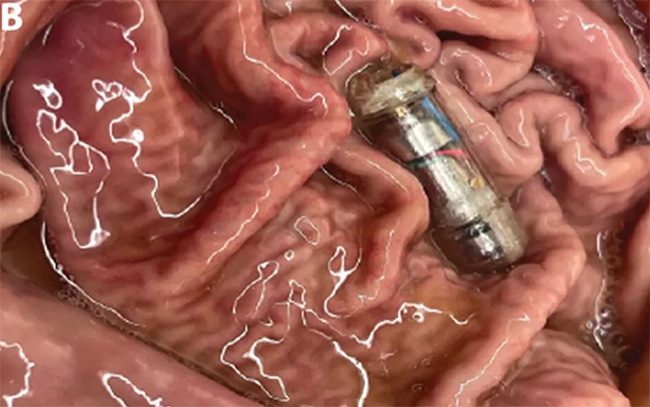A research team at the Massachusetts Institute of Technology (MIT) has developed a high-tech “pill” that stimulates receptors in the stomach to create a feeling of fullness.
VIBES, which stands for Vibrating Bioelectronic Gastric Stimulator, has recently been published in the journal Science as a promising solution for safe weight loss in the future. Although it hasn’t been tested on humans yet, trials conducted on pigs have shown very promising results.

The VIBES capsule activates upon contact with gastric fluids. (Image: Oddity Central).
The VIBES vibrating stimulator is about the size of a vitamin pill, battery-operated, and can be activated either by contact with gastric fluids or through an integrated timer. After achieving its desired effect, the pill will exit the body along with other solid waste.
As a result, about 30 minutes after VIBES is activated, the pigs consumed nearly 40% less food compared to when not using the smart pill.
This device works by vibrating to activate receptors in the stomach, simulating the presence of food. The brain also receives signals prompting the release of additional hormones that make us feel satiated.
The development team for VIBES further explains that taking the smart pill 20 to 30 minutes before a meal will trigger the sensation of fullness earlier.
This innovative product is the brainchild of researcher Shriya Srinivasan, Ph.D. from MIT, who is currently an Assistant Professor of Bioengineering at Harvard University. During her years at MIT, she became interested in controlling the connection between the brain and stomach by stimulating mechanosensory organs along the stomach through vibrational motion.
The good news is that this pill will cost less than $1. Ultimately, researchers say they could implant the stimulator into the human body so that people would not need to continuously swallow it.
“Our research demonstrates the effectiveness of a non-invasive, low-cost intervention to reduce food intake and calorie consumption,” said Giovanni Traverso, a gastroenterologist at Brigham and Women’s Hospital and co-author of the study.
This device has the potential to revolutionize treatment methods for obese patients. However, future studies will need to explore the physiological impacts of the device before it can be made available to patients.
Researchers are looking to scale up the production of the VIBES capsules to conduct clinical trials in humans.




















































